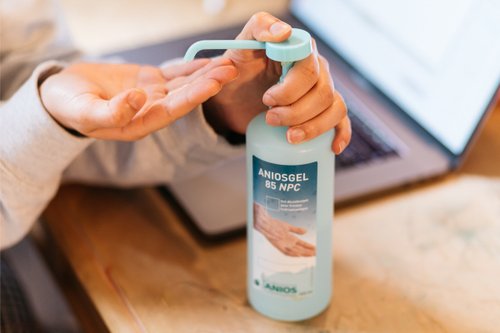"How can you afford that?" And other work questions we’d like to ask TV characters
07 mar 2023
7 min


US community manager and film enthusiast
Take a seat on the couch and switch on. The view on your television could be a mirror onto the outside world.
These days, there certainly isn’t a lack of world events we need to reflect on. This decade has barely started, but it’s been a procession of bad news for many American workers with Covid-19, layoffs, inflation, and fears of recession. During times like these, is it too much to hope that the movies and series we turn to after a long day at work would reflect the questions we are grappling with?
Some shows might respond lukewarmly to that proposition. So, with the release of the third season of Emily in Paris last fall, season four of You, and a new rom-com called Your Place or Mine, we take a look at some of the work tropes baked into these Netflix scripts.
Emily in Paris: the magic and ease of working abroad
Emily in Paris is no stranger to criticism for its less-than-realistic depictions of every topic it touches. So if the show is low-hanging fruit, why pull it apart? Because that’s what makes it so fun to discuss!
In Emily in Paris, a series from Darren Star, the creator of Sex and the City, Lily Collins plays Emily Cooper, a midwestern American who is sent to France by her company to work at its French marketing arm. She moves to an amusement park that resembles Paris. This modern city is reduced to little more than its whitest, wealthiest, and apparently car-less, roads.
But what does it say about work?
It says that it’s easy to pick up, move across the world, and start again in a foreign country. It perpetuates the idea that Americans can overlook the financial, administrative, and cultural barriers that come with living abroad.
When it comes to getting a visa, Emily would most likely have sought an “Intra-company transfer” residence permit (“Salarié détaché ICT”). Strangely, even though the French are famed for their sticky bureaucracy, this is the one stereotype missing from the show. We never see Emily in line at the préfecture of the appropriate government department. We never see her struggle to gather papers or have the only ID printer conveniently break during lunchtime, just to be magically working again an hour later. One government worker was clearly hungry. Ultimately, Emily seems to live in a utopian world where no one needs papers. If only it were that easy!
But beyond legal logistics, Emily often floats in an English-language bubble at work, never having to conform to a majority Francophone workplace. She doesn’t commit in a real way to learning and using the language.
Instead, she forces her colleagues to adapt to her, whether that means implementing ideas with clients without checking in with higher-ups, speaking out of turn at meetings, or forcing Americanised ideas for projects on French cultural brands. In short, we never see Emily struggle in a real way over cultural differences.
In the US, being visible, speaking up, and being relentlessly positive are valued in the workplace. But in France, talking too much in meetings can be seen as speaking out of turn and not deferring to established hierarchies. And sure, hierarchies can be useful, especially as a reminder that colleagues sometimes have more knowledge or experience. Also, while her French boss, Sylvie, is seen as harsh, this is only because French feedback tends to be less sugar-coated in positives. For us Americans, overly positive feedback can sometimes keep us from having harder conversations with superiors, or learning and growing from mistakes. Emily never considers that this is a cultural difference she could learn from.
Lastly, how does she afford this luxurious lifestyle abroad?
Emily’s lifestyle costs have been estimated at about $120,000 a year, her clothing alone costing almost $80,000, according to financial experts at New Casinos. Since we actually know Emily’s address in Paris – Place de l’Estrapade in the 5th arrondissement – they could estimate that her rent would be $2,822 per month, given the size and location. To get a place like that in the real world, Emily would have to hand over more than $30,000 a year in rent.
How does this compare to her salary? The financial experts estimated Emily’s annual salary to be about $46,980. That is more than the average salary for those in marketing in France, which is about €40,000 per year ($42,730), according to Glassdoor.fr.
You: the magic of climbing up the career ladder
In the first season, which premiered in 2018, Penn Badgley plays Joe Goldberg, a serial killer and independent bookstore manager, who becomes obsessed with a girl who comes into the shop. He stalks her, and it ends up getting messy.
After three seasons of slight variations to this formula, Joe moves to London in pursuit of another victim in season four. Like Emily, he never has to struggle during the move, even though he is traveling under a false identity and as a person of interest in a dozen or so murders. He even lands a sweet gig as a professor at a seemingly respected university.
Joe Goldberg teaches us it’s easy to climb the ladder!
While Joe is wealth-adjacent for many seasons of You, this is the first season in which we see him not as an ordinary worker, but as a successful professor. This is an important departure, as it puts him on par with the group of privileged people he infiltrates.
But why do his depictions of the wealthy – in oddly long voiceovers – always seem so garish and unsubtle? Maybe it’s because his income and ascension into wealth and a distinguished career feel just as cartoonish. Thanks to Indeed.com, we can clock the average salary as about £49,243 ($59,240), which is 50% above the UK national average, though not overly generous.
But Joe lives in South Kensington. No doubt picked for its connection to France, which is stronger than Marienne’s, the not-French, French woman he stalks. Anyone familiar with London knows that this is a pricey neighborhood. According to Foxtons, a real estate company, the average rent in South Kensington is about £771 per week, which adds up to about £3,000 a month or £37,000 a year. That doesn’t leave him with a lot of spare change to cover his living expenses. Maybe he is saving money elsewhere?
Or maybe not. Joe’s wardrobe is not so salt-of-the-earth either, according to ShopyourTv. com, a site dedicated to finding clothing seen in the series. During the show, he sports a cashmere sweater vest costing £140, Ray Ban glasses that cost £135, and a Celine blazer that can be had for the bargain price of nearly £2,000.
This academic is unable to give nuanced critiques on the merits of the wealth and careers of those around him because he ignores how he is complicit in the core tenets of their ideology: invent yourself, your accolades, and skyrocket into an illustrious career while maintaining your outsider facade!
He should have time to mull over all of this on his way to work through. In the real world, it’s a six-hour walk from campus to his neighborhood. But he says he likes walking to work, so he’s just like us!
Your Place or Mine: the magic of instant networking in the arts
Ashton Kutcher and Reese Witherspoon star as Peter and Debbie, two people who slept together once and then, over the following 20 years, developed a long-distance friendship in Your Place or Mine, a recently released Netflix Original film.
Debbie, who lives in LA, is due to travel to NYC where Peter lives. But then her sitter lets her down and she needs someone to watch over her son. Peter offers to step in to help so they do a house swap.
We wait in vain for any explanation as to why Peter is so wealthy. He lives in a spacious apartment, with a million-dollar view of the Brooklyn Bridge, but his job is never sufficiently detailed. At least Hollywood has caught on that Brooklyn is now flush with cash.
But unrelated to Peter’s career as a possible arms dealer, we find out that he harbors a secret hope of becoming a novelist. Then, during their house swap, Debbie discovers Peter’s manuscript, which he has bound and kept in a folder next to the bed.
By convenient design, the night before, Debbie had met a handsome and important guy from a commercial publishing house. She is then able to pass on the manuscript to him. The real shocker here is that he promises to read it. I think everyone knows where this one is going, but after reading, he describes the manuscript as genius and says he plans to publish it.
It’s interesting that this trope could survive in the current job market concerning the arts. Being a creative has never been easy, but being a creative who is recognized immediately for his genius makes Peter a unicorn.
Let’s unpack this further. In order to get your book sold, you need an agent. A typical agent in New York can receive about 2,000 submissions a year, usually accepting two to three writers or fewer, according to Jericho Writers, a company that offers writers editorial assistance. It calculates the chances of getting an agent to be about 1 in 1,000.
Then your agent might try to sell your work to one of the big five publishers – Penguin Random House, Hachette Book Group, Harper Collins, Simon and Schuster, or Macmillan – as they prefer to deal with literary agents, rarely taking open or unsolicited submissions.
The publishing industry tends to be secretive, but Jericho Writers says that literary agents in these big publishing houses receive about 12 submissions a week, or about 600 manuscripts a year. They usually take on three to four. That’s less than a 1% acceptance rate.
Go to an independent publisher? The Big Five publishing houses control more than 80% of the trade book market in the United States as of 2022, according to WordsRated, a non-commercial, international research data and analytics group. Recently Penguin tried to buy Simon and Schuster, further consolidating the industry until the Biden administration blocked the sale.
What does this mean? That it’s competitive and costly to try to succeed in the arts, even with networking, which has become harder. During the pandemic, our professional and personal networks shrank by close to 16% or more than 200 people, according to Harvard Business Review.
In our attempts to make new connections, our business and personal relationships can begin to feel transactional, or exploitative. You may meet a publishing mogul in a bar, but what do you have to give them in exchange for reading your manuscript?
Even vying to get a powerful higher-up to read your manuscript can sometimes demand favors or pull, which might put yours at the top of the pile. This puts people from low-income backgrounds, people of color, women, or anyone without connections at a huge disadvantage.
Your Place or Mine comes at a time when discussions of nepotism permeate creative industries, showing how networking is not just about who you know, but who your relatives know too. So why does this film still push the fairy-tale “meritocracy conquers all” line?
The takeaways
Are these streaming shows and movies all that deep? No, but also yes. There’s a reason we tend to notice these silly money and career tropes in troubled economic times. Many people are struggling at work.
So whether you think media should be a mirror or an escape, it certainly has a way of taking truths about the world of work and warping them into their most caricature-ish form: the successful expat, the distinguished professor, and the published author. Best to remember what’s real when you step out of the soft lighting of a living room and into the fluorescent glare of an office.
Photo: Welcome to the Jungle
Follow Welcome to the Jungle on Facebook on LinkedIn and on Instagram and subscribe to our newsletter to get our latest articles every day!

Más inspiración: Office life

Covid office etiquette: when colleagues break the rules
We've all had that one colleague with zero sense of personal space. During Covid-19, such behaviour is not only annoying, but also a health hazard.
03 nov 2021

Hygiene tips for returning to office post-lockdown
We spoke to health and safety expert Neil Cruden about how you can help to make your workplace as safe as possible and avoid the spread of Covid-19.
04 jun 2020

Why we can’t (or can) wait to get back to the office
As the lockdown winds down, those of us who can't work from home are returning to work with our love/hate relationship for our offices.
15 may 2020

That time I got drunk at the office Christmas party
“Hey, how’s it going? What would you like to drink?” “Yes,” she replied. It was going to be one of those parties.
23 dic 2019

Ho, Ho, Ho: how to survive Secret Santa in the office
Secret Santa is a great way to build rapport at work. We suggest these gift ideas because it’s better to be boring than risk an awkward moment.
16 dic 2019

¿Estás buscando tu próxima oportunidad laboral?
Más de 200.000 candidatos han encontrado trabajo en Welcome to the Jungle
Explorar ofertas